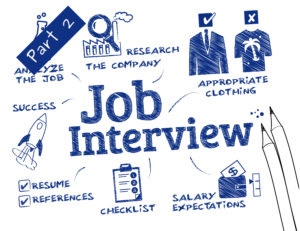In Part 1, we discussed preparing yourself for your up-coming job interview and researching the organization you will be interviewing with. In Part 2, we will take a look at researching the job & getting to the interview successfully.
The Job
Now it’s time to prepare for the specific position you are interviewing for. Start by reviewing the job posting. In most cases, the position will be somewhat generic; and you will need to read between the lines a bit to understand the hiring manager’s business need. Write this down along with at least three questions that will help you clarify the need, and keep it handy at the interview–you will want to clarify the business need / opportunity when discussing the position. Next, map this business need to specific examples in your resume that demonstrate where and when you have encountered similar challenges and prepare your response.
Be prepared, as well, to discuss how the role to be filled in the hiring organization could evolve as well as other opportunities for growth. Apart from demonstrating your interest in the position, it provides insight into how the position fits within your over-all career path. Your mission in attending the interview is to confirm the “fit” is there: that you are a fit for the position; and the position is a fit for you.
Successful Arrival Logistics
One of the best ways to demonstrate superior qualities of disorganization and an inability to meet deadlines is to show up late for the interview. While acts of God do occur, being late is simply inexcusable because you have the ability to prepare in advance. Now that we’ve got that out of the way, how can you ensure timely arrival?
Start by ensuring you have the contact information of the person who scheduled the interview and, if applicable, the person you will be meeting with. Communication is key; and you’ll want to be able to get in touch should, say, security refuse to let you in the building.
Next, consider the location: How will you get there—are you driving; or taking public transportation? Both have challenges; and you’ll want to know of any road closures or the potential delays in advance. Goggle Maps and Waze can be helpful; but they are not infallible. If possible, test your planned route in advance (this also gives you an indication of the time and effort you can expect for the daily commute).
Plan to arrive 30 minutes in advance of the interview start time. This leaves enough of a buffer for you to get to the entrance of the organization and compose yourself. If you are more than 10 minutes early, give yourself a pat on the back, go for a coffee and relax because you’re on-time and you’ve got your act together. This is a good time to do some industry-related reading (e.g. newspaper or trade journal)—doing so will help take your mind off being nervous, boost your confidence and give you some industry-related, current events to discuss should the opportunity present itself.
Ten minutes prior to the scheduled interview start time, return to the interview location; and announce your arrival to reception.
Last words
You have been invited to attend an interview because someone, somewhere believes you may have what it takes to perform the activities they need help with. It is natural to have feelings of fear and apprehension in the days and hours leading up to the interview. That said, having a solid plan for an interview will go a long way to dealing with these feelings because, in doing so, you build confidence that will exude during the interview. This is your opportunity to demonstrate what you are capable of. Get up on stage and sell yourself!
Need some help streamling your job search process so you can achieve your goals? Contact us for a complimentary 15-minute over-the-phone career transition session.




